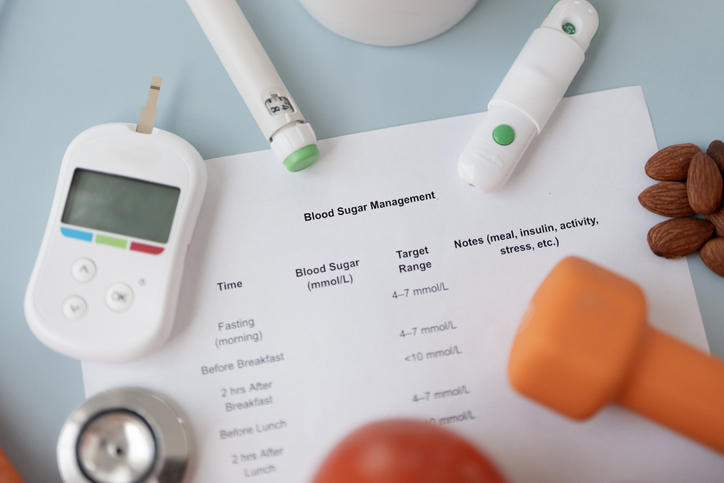Type 1 Diabetes
Type 1 Diabetes
Type 1 Diabetes
Type 1 diabetes, often called juvenile diabetes, is less common than type 2 diabetes. It can also be more severe. Most people with type 1 diabetes need to take insulin every day. At Carilion Clinic, our diabetes care team will help you manage your insulin.
Carilion treats both children and adults with type 1 diabetes. People usually think of it as a disease that develops in kids and young adults, but 37% of new type 1 diabetes diagnoses occur in adults over 30.
Our Carilion Children’s endocrinologists help diagnose, develop care plans and provide ongoing care for kids and young adults with diabetes. Adults with type 1 diabetes see a Carilion endocrinologist for ongoing care. We provide expert care for latent autoimmune diabetes in adults, type 1 diabetes that develops in adulthood.
Type 1 diabetes, often called juvenile diabetes, is less common than type 2 diabetes. It can also be more severe. Most people with type 1 diabetes need to take insulin every day. At Carilion Clinic, our diabetes care team will help you manage your insulin.
Carilion treats both children and adults with type 1 diabetes. People usually think of it as a disease that develops in kids and young adults, but 37% of new type 1 diabetes diagnoses occur in adults over 30.
Our Carilion Children’s endocrinologists help diagnose, develop care plans and provide ongoing care for kids and young adults with diabetes. Adults with type 1 diabetes see a Carilion endocrinologist for ongoing care. We provide expert care for latent autoimmune diabetes in adults, type 1 diabetes that develops in adulthood.
Type 1 diabetes is when your body can’t process the sugar in your food right. It leads to too much sugar in your blood. This happens because of a problem with your body’s immune system. It mistakenly destroys the cells in your pancreas that make insulin.
Without insulin, your body can’t use the glucose in your blood. The glucose stays in your blood, making your blood sugar go up. High blood sugar can cause problems in your heart, kidneys, eyes, feet and teeth.
Without daily insulin, people with type 1 diabetes can get very sick. They can even die.
Type 1 diabetes vs. type 2 diabetes
Type 1 and type 2 diabetes are both diseases that cause people to have high blood sugar.
Type 1 diabetes is an autoimmune condition, meaning the body’s immune system causes it. The body mistakenly attacks the cells in the pancreas that produce insulin. The body stops making insulin.
Type 2 diabetes is not an autoimmune condition. It happens because the cells aren’t responding as they should to insulin. They become insulin resistant.
Type 1 tends to develop at a younger age. The median age, where half are younger and half older, at diagnosis is 24. Type 2 happens more later in life and often comes on slowly. Also, type 1 isn’t preventable the way type 2 often is. Type 2 is often treatable with weight loss and lifestyle changes.
What causes type 1 diabetes?
There’s a lot unknown about what causes type 1 diabetes.
With type 2 diabetes, lifestyle and weight seem to play a role. The same isn’t true for type 1 diabetes. It’s an autoimmune condition, and nothing a person does causes it.
We do know that genes play a role in type 1 diabetes. Having a family history of diabetes can make you more likely to develop it.
Infections or other things in the environment might also play a role in type 1 diabetes. Researchers are actively trying to learn more about the causes.
You can’t prevent type 1 diabetes. But you can manage it and live a healthy life.
What Is Type 1 Diabetes?
Type 1 diabetes is when your body can’t process the sugar in your food right. It leads to too much sugar in your blood. This happens because of a problem with your body’s immune system. It mistakenly destroys the cells in your pancreas that make insulin.
Without insulin, your body can’t use the glucose in your blood. The glucose stays in your blood, making your blood sugar go up. High blood sugar can cause problems in your heart, kidneys, eyes, feet and teeth.
Without daily insulin, people with type 1 diabetes can get very sick. They can even die.
Type 1 diabetes vs. type 2 diabetes
Type 1 and type 2 diabetes are both diseases that cause people to have high blood sugar.
Type 1 diabetes is an autoimmune condition, meaning the body’s immune system causes it. The body mistakenly attacks the cells in the pancreas that produce insulin. The body stops making insulin.
Type 2 diabetes is not an autoimmune condition. It happens because the cells aren’t responding as they should to insulin. They become insulin resistant.
Type 1 tends to develop at a younger age. The median age, where half are younger and half older, at diagnosis is 24. Type 2 happens more later in life and often comes on slowly. Also, type 1 isn’t preventable the way type 2 often is. Type 2 is often treatable with weight loss and lifestyle changes.
What causes type 1 diabetes?
There’s a lot unknown about what causes type 1 diabetes.
With type 2 diabetes, lifestyle and weight seem to play a role. The same isn’t true for type 1 diabetes. It’s an autoimmune condition, and nothing a person does causes it.
We do know that genes play a role in type 1 diabetes. Having a family history of diabetes can make you more likely to develop it.
Infections or other things in the environment might also play a role in type 1 diabetes. Researchers are actively trying to learn more about the causes.
You can’t prevent type 1 diabetes. But you can manage it and live a healthy life.
We usually diagnose type 1 diabetes in kids and young adults. People with type 1 diabetes will usually have symptoms that seem to come on suddenly. Young adults may have a slower progression of symptoms. You may notice your child:
- Urinating more than usual
- Drinking more water and being thirstier
- Eating more, but losing weight
However, sometimes with children, the first sign that something is wrong is symptoms of diabetic ketoacidosis (DKA). DKA is a medical emergency that happens when your body doesn’t have the insulin it needs. DKA symptoms include:
- Feeling overly tired
- Fainting
- Having nausea, vomiting or stomach pain
- Having trouble breathing
- Having breath that smells fruity
Parents often wind up going to the emergency room, and that’s when a child is first diagnosed.
Adults who develop type 1 diabetes may have symptoms similar to those of type 2. This includes things like excessive thirst, being overly tired or having numbness. Adults might need special tests to understand which type of diabetes they have.
We use blood tests to diagnose type 1 diabetes. We measure blood glucose, but also look for certain autoantibodies.
Type 1 Diabetes Symptoms and Diagnosis
We usually diagnose type 1 diabetes in kids and young adults. People with type 1 diabetes will usually have symptoms that seem to come on suddenly. Young adults may have a slower progression of symptoms. You may notice your child:
- Urinating more than usual
- Drinking more water and being thirstier
- Eating more, but losing weight
However, sometimes with children, the first sign that something is wrong is symptoms of diabetic ketoacidosis (DKA). DKA is a medical emergency that happens when your body doesn’t have the insulin it needs. DKA symptoms include:
- Feeling overly tired
- Fainting
- Having nausea, vomiting or stomach pain
- Having trouble breathing
- Having breath that smells fruity
Parents often wind up going to the emergency room, and that’s when a child is first diagnosed.
Adults who develop type 1 diabetes may have symptoms similar to those of type 2. This includes things like excessive thirst, being overly tired or having numbness. Adults might need special tests to understand which type of diabetes they have.
We use blood tests to diagnose type 1 diabetes. We measure blood glucose, but also look for certain autoantibodies.
Treating type 1 diabetes is all about helping people manage their blood sugar. We use tools like continuous glucose monitors and insulin pumps to make it easier.
At Carilion, we treat both children and adults.
Children with type 1 diabetes will see our pediatric endocrinology team at Carilion Children’s. This team works specifically with people under the age of 18.
You’ll learn things like:
- How to watch for and treat low blood sugar
- Warning signs of DKA
As children get older, our pediatric team will work with them to help them take more ownership of their diabetes.
If you’re over 18, you’ll see an adult endocrinologist at Carilion. Adult endocrinologists see:
- People transitioning from pediatric care
- People with a new diagnosis
- People struggling to manage their diabetes
- People interested in getting an insulin pump
Most people with type 1 diabetes benefit from using a continuous glucose monitor (CGM). This device can track your blood glucose level 24/7. It uses sensors you place on your skin that record all the data.
Insulin is the most vital drug to a person with type 1 diabetes. You can take insulin through an injection (with a needle), a pen injector or an insulin pump.
An insulin pump is a small device that gives insulin through a tube through your skin. The pump works with your CGM to deliver the right amount of insulin. Our insulin pump program can help you learn how to use and maintain the pump.
There are other promising treatments for type 1 diabetes. This includes a drug that may delay the need to take insulin in kids, called Teplizumab.
Some treatments work at the level of the pancreas, including:
- Artificial pancreas
- Pancreas cell transplant
- Pancreas transplant
How We Treat Type 1 Diabetes
Treating type 1 diabetes is all about helping people manage their blood sugar. We use tools like continuous glucose monitors and insulin pumps to make it easier.
At Carilion, we treat both children and adults.
Children with type 1 diabetes will see our pediatric endocrinology team at Carilion Children’s. This team works specifically with people under the age of 18.
You’ll learn things like:
- How to watch for and treat low blood sugar
- Warning signs of DKA
As children get older, our pediatric team will work with them to help them take more ownership of their diabetes.
If you’re over 18, you’ll see an adult endocrinologist at Carilion. Adult endocrinologists see:
- People transitioning from pediatric care
- People with a new diagnosis
- People struggling to manage their diabetes
- People interested in getting an insulin pump
Most people with type 1 diabetes benefit from using a continuous glucose monitor (CGM). This device can track your blood glucose level 24/7. It uses sensors you place on your skin that record all the data.
Insulin is the most vital drug to a person with type 1 diabetes. You can take insulin through an injection (with a needle), a pen injector or an insulin pump.
An insulin pump is a small device that gives insulin through a tube through your skin. The pump works with your CGM to deliver the right amount of insulin. Our insulin pump program can help you learn how to use and maintain the pump.
There are other promising treatments for type 1 diabetes. This includes a drug that may delay the need to take insulin in kids, called Teplizumab.
Some treatments work at the level of the pancreas, including:
- Artificial pancreas
- Pancreas cell transplant
- Pancreas transplant
You can live a healthy life with type 1 diabetes. Historically, the type 1 diabetes life expectancy has been 10 - 12 years shorter than that of those without the disease.
However, the gap is getting smaller because of research and new ways to monitor and deliver insulin. People living with type 1 diabetes are 25% less likely to die early now than they were in 1990.
The key to living with type 1 diabetes is managing every area of your health. You may not need to see an endocrinologist often. But you will want to have regular:
- Primary care check-ups
- Foot health check-ups (with a foot doctor)
- Dental check-ups
- Eye exams
Because you’ll need to pay close attention to what you eat, many people with type 1 diabetes work closely with a registered dietitian. If you're thinking of getting pregnant, you’ll need to work very closely with your doctor.
Living With Type 1 Diabetes
You can live a healthy life with type 1 diabetes. Historically, the type 1 diabetes life expectancy has been 10 - 12 years shorter than that of those without the disease.
However, the gap is getting smaller because of research and new ways to monitor and deliver insulin. People living with type 1 diabetes are 25% less likely to die early now than they were in 1990.
The key to living with type 1 diabetes is managing every area of your health. You may not need to see an endocrinologist often. But you will want to have regular:
- Primary care check-ups
- Foot health check-ups (with a foot doctor)
- Dental check-ups
- Eye exams
Because you’ll need to pay close attention to what you eat, many people with type 1 diabetes work closely with a registered dietitian. If you're thinking of getting pregnant, you’ll need to work very closely with your doctor.
At Carilion, we help people manage their diabetes and other endocrine conditions every day. We offer the latest care options and tools close to home.

Researching new treatments
Our partnership with Virginia Tech Carilion School of Medicine means we're always researching new ways to treat endocrine problems and improve care. We even conduct research focused on southwestern Virginia.
Why Choose Carilion Clinic?
At Carilion, we help people manage their diabetes and other endocrine conditions every day. We offer the latest care options and tools close to home.
Health and Wellness

Helping Your Child Adapt to Life With Type 1 Diabetes

What You Need to Know About Type 1 Diabetes

The 4 M's of Diabetes Management
Get Care at Carilion Clinic
Treating the people of western Virginia for more than 70 years, we're proud to continue bringing the latest endocrine treatments to our community. We're working to make it easier than ever to connect with us and find the care you need.
Get Care at Carilion Clinic
Treating the people of western Virginia for more than 70 years, we're proud to continue bringing the latest endocrine treatments to our community. We're working to make it easier than ever to connect with us and find the care you need.
Get Care at Carilion Clinic
Treating the people of western Virginia for more than 70 years, we're proud to continue bringing the latest endocrine treatments to our community. We're working to make it easier than ever to connect with us and find the care you need.
Get Care at Carilion Clinic
Treating the people of western Virginia for more than 70 years, we're proud to continue bringing the latest endocrine treatments to our community. We're working to make it easier than ever to connect with us and find the care you need.

